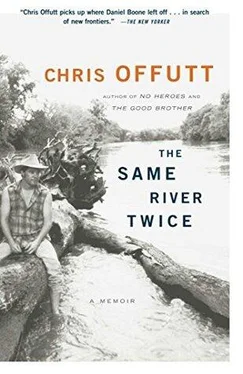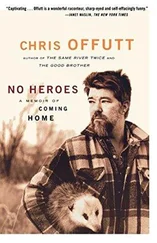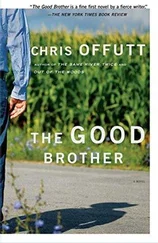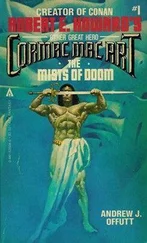“You’ll be all right,” I said.
Dane gagged and retched. The stench rose, palpable as river sludge. My foot slid off the sink and I tumbled to the tile, landing spread-eagle on my back. Dane staggered from the stall.
“You split your pants, Chris.”
“And you’ve got puke on your ascot.”
He helped me up and we swapped ties. If I walked carefully, the swallowtail would conceal the ripped seam. Dane gave me the rings. Each of us waited for the other to initiate a hug, but the mutual need made us incapable and afraid. Knowing we wanted to was almost enough. We shook hands across the urinal.
The families bunched the chapel like cheering sections at a home-coming game. The king and queen grandly strode the center aisle, followed by Jeanie and Ahmed, then Sue and me. Every few steps I lit candles with a four-foot flame rod that responded to a trigger in its handle.
The air filled with candle smoke, weeping, and the photographer’s flash. Half blinded by the strobe, Ahmed stumbled into Jeanie, who dropped her bouquet. I bent to pick it up and the flame rod swung wild, clipping Ellen’s great-aunt across the temple. Our procession continued until we faced the holy man, a chubby guy with a pitted nose. After the mumbo jumbo, he stared at the puke on my ascot and asked for the rings. My clan gained a sister and a daughter. Her family lost on all fronts.
The reception room was hot and we carried our watery punch to the parking lot. I hunted the great-aunt to apologize. She was stilt in the church bragging that the Lord had touched her during the ceremony. Her companion winked and waved me away. Outside, pockets of family squared off like gangs in a street fight. Our linked tribes milled about, smiling without touching, obeying invisible picket lines. We were a black sheep flock mired by secrets that everyone knew. Feud and subterfuge etched our past.
“I’m in the restaurant business,” I told everyone. “Be opening my own place soon. Business is for me.”
I tarried in the lot, watching blood-kin strangers depart as furtively as they had come. My tux itched. After quick goodbyes, J.J. and I vaulted into his car and roared away. The family had come together like a handful of uneven strands temporarily spliced. We were Penelope’s filament, secretly unraveled each night, then re-woven for public sight.
J.J. popped open the glove box and tossed a bottle of amphetamines in my lap. Melancholy melted into time-released segments of joy. He dropped me off in Indiana and I hitchhiked north.
Beneath a tree outside of Scranton, Pennsylvania, I snuggled into my sleeping bag. The Milky Way spread across the chilly sky and I gave up on being a playwright. It was not free enough, was dependent on director, actor, set designer, even the audience. I decided to become a poet. My life was already flowing along lines that, if not poetic, were too grim to consider. As in hitchhiking, there were no rules in poetry. What few poems I’d read had dispensed with punctuation, logic, and rhyme — all severe restrictions to my dormant creativity. Poems were often short, which would allow me to flourish in the realm.
I zipped the bag tight and pulled into a ball. I felt as if I might explode and implode simultaneously. When I stopped fighting, the tears arrived. The scent of exhaust drifted from the highway. The ground was soft, a comfort.
Dane did everything properly, made all the correct decisions. He had a lovely wife, would eventually own nice things, and make the standard visits home. None of it mattered. He could never overcome the betrayal of a family that had always loved me more than him. My wild behavior was a prolonged effort to get out from under the burden, and I wondered if the opposite was true for Dane. If so, I hoped he didn’t realize it. One poet per family was enough.
My return to Salem possessed all the heralded pomp of a rising ghost. I was determined to live, breathe, and eat poetry. In a fit of creativity, I taped photographs of great poets to the edge of a mirror and hung it above my desk. As long as I sat facing the mirror, my face joined their ranks, and I belonged with them. I spent most of my time peeking at the mirror from across the room, waiting for inspiration. Twice I sat at the desk. An incredible tension rose within me. My stomach hurt, and I could not grasp a pencil. There was poetry in the mirror but I had no idea how to get it out. The photographs mocked me. My mind felt like an old brick.
I scrounged a night job washing dishes at a bar near the waterfront. Free beer and food propped the low pay. The weather turned cold and I spent my days at the library for warmth, joining the rest of Salem’s kooks, We all claimed chairs in the periodical room, pretending to read beneath the librarian’s hostile gaze. When one of our band died, everyone moved up a seat, closer to the radiator. Rather than reading poems, I scribbled essays about the sheer joy of poetry, proclaiming poets as the true masters of language. Being one was vastly more important than committing verse to paper. The more pages I filled in my diary, the more I felt like a genuine bard.
Shadrack moved to Boston, and I could no longer afford to rent our dump. I crashed with a sympathetic waitress, who let me sleep in a hammock suspended in her kitchen. Eventually we began making sorties into each other’s rooms. At the end of a year she left me for a Navy Seal because, as she said, “He knows what he wants from life.” I explained that poetry was just as valid as fastening bombs to enemy ships. She shot from the hip, barely aiming, and nailed me in my own cross hairs — I hadn’t written a poem since we’d met.
When she asked for help moving, I agreed, thinking she would change her mind. After two days of divisive labor, she gave me a warm six-pack and took the hammock away. I slept on the floor. Boone had said that no Indian who claimed to be a friend had ever deceived him but you could never trust New Englanders.
The Iowa sky is a gray mosaic seen through bare tree limbs. Rita is uncomfortable in every position. Our child performs acrobatics within the placental tautness of her belly. Her urination has taken on the obsessive quality of a hobby and is the source of all conversation. At night the temperature drops to twenty below. Windchill reduces the air to negative sixty, offering the chance of death within five minutes. Skin will freeze in seconds.
While sleeping, Rita cradles her belly with her forearms, backside shoving against me, legs folded like wings. The seminal stage of family is already pushing me aside. I dress and leave at dawn. Crows chase a barred owl caught in the sun’s pink glow.
The opacity of fresh snowfall unfolds like a silent fan. The woodpile tarp is welded to the ground. I have begun to see pregnancy everywhere, the curve of a belly, the strain of release. Women give form to the language of life. Without them, men are mute. If fatherhood is compromise, then motherhood is sacrifice, an abandoning for the sacred, an act of heroism. Aztec women who died in childbirth went to the same exalted branch of heaven as warriors slain in battle.
Frontier women had an average of eight babies apiece before they were Rita’s age, often ruining their bodies in the process. Many died young. It was not uncommon for men to marry again after wearing the first wife out. The notion of Rita’s death petrifies me into five minutes of somnolence, staring at an oak. Strips of snow lie in the furrows of its striated bark. I don’t know which would be worse — losing my mate or raising a child alone. The obvious answer pummels me with shame. My concerns for Rita’s mortality have little to do with her. I want her alive to make life easier for me.
I release the oak beside the river or perhaps the oak releases me. Blizzard scraps from two weeks back lie in shade strips cast by trees. Breath is condensing to ice on my beard. The control of fire keeps us warm and separates us from animals more than the wheel. Our house sits on a stretch of river between two sharp curves. Sewage from town prevents these bends from freezing and bald eagles have begun to fish the open water. They scan the river from high limbs. Water gurgles like distant music beneath the river’s lid of ice, bubbling through the slits.
Читать дальше












